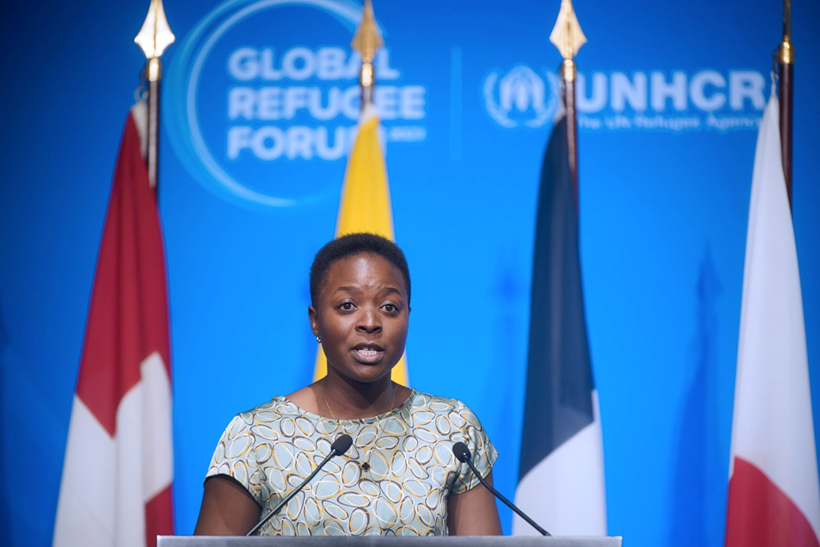In this section
In this sectionThe Global Refugee Forum (GRF) is an event that happens every four years to enable those involved in responding to the refugee crisis globally to exchange successful approaches and commit to offering financial aid, technical expertise, and policy reforms to enhance overall support for refugees and achieve the goals outlined in the Global Compact on Refugees (GCR). The GCR is a UN framework set out to ease the burden of hosting forcibly displaced persons by supporting the host countries through sharing the burden and responsibilities. The approach involves boosting refugee self-reliance, increasing opportunities for resettlement in third countries, and supporting efforts to create safe and dignified conditions for their return to their home countries.
The GRF 2023 convened in Geneva, Switzerland, aiming to generate impactful and transformative commitments from a diverse group of stakeholders. These pledges encompassed climate-resilient sustainable human settlements for refugees and their host communities, climate action and finance, and the Refugee Environmental Protection (REP) Fund. Additionally, commitments were made in areas such as education, economic inclusion, social protection, agriculture, food systems, and food security, among others.

© UNHCR/Jose Cendon
Joelle Hangi, Inclusivity Lead at the GPA, announcing the multi-stakeholder pledge on energy and climate at the Global Refugee Forum 2023.
Notably, clean energy emerged as a crucial catalyst in achieving and facilitating the realization of the aforementioned pledges in displacement settings. For instance, discussions around climate-resilient human settlements, climate action and finance, and refugee environmental protection would be unrealistic without acknowledging the crucial role of clean energy and energy transition as indispensable enablers of these commitments.
The GRF 2023 brought together over 4,200 participants from 168 countries, including around 300 refugee delegates. Regardless of the considerable number of refugee representatives, displaced persons experience unique challenges with the recognition of their travel documents across different countries and securing visas. Moreover, refugee participation at GRF is limited by the pre-organised plans and engagements of the sponsoring institutions which support the refugees. Therefore, their contributions and influence during and after the GRF are very limited.
The GRF 2023 saw over 1,600 pledges to support refugees and their host communities, including 43 multi-partner commitments led by governments. An estimated $2.2 billion in new financial commitments by states and other actors was announced, and some $250 million was pledged by the private sector. The Multi-Stakeholders Pledge is a new approach that UNHCR introduced to bring different stakeholders together with the aim of encouraging them to pledge and work toward one common goal. Climate Action is one of the Multi-Stakeholders Pledges to ensure hosting developing countries and communities in climate-vulnerable, fragile, and conflict-affected settings receive improved access to climate action, including capacity-building and financing by 2027. The pledge will ensure refugees and other categories of forcibly displaced persons living in these settings receive comparable support for climate action as nationals and are included in all relevant laws, policies, plans, and programs. The translation of the pledge into reality is something that is still ambiguous, as the implementation plan is still unknown.
The UNHCR, as the convener of the GRF, and the ultimate manager of all the collected resources has a strong authority over the mobilised fund and its management. Thus, the influence of refugees and their organisations on various plans, programming, and funding is not guaranteed since their voices and response have not been considered adequately in the humanitarian sector. An interesting question that may be asked four years from now is, ‘How much of the fulfilled pledges will have been accessed by refugee-led initiatives directly?’ However, the GPA Coordination Unit, through its program on Transforming Humanitarian Energy Access (THEA), has been working towards ensuring transformative change in the humanitarian sector and ensuring an inclusive shift where displaced persons are valued as co-actors in the discourse of improving energy access in the displacement settings. This requires recognising the value and contribution displaced persons bring to the humanitarian sector as agents of change capable of formulating sustainable solutions to everyday challenges they face in displacement settings. For more details and guidance on the inclusivity of displaced persons, please have a look at The Inclusivity Strategic Outlook.
The blog was written by Joelle Hangi & Epa Ndahimana as part of the deliverables of Transforming Humanitarian Energy Programme (THEA) funded by the UK government's Transforming Energy Access (TEA) programme
Last updated: 19/01/2024
